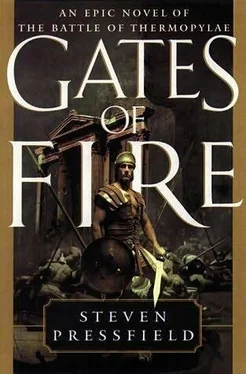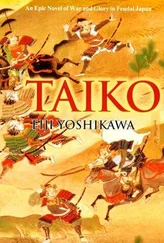Steven Pressfield - Gates of Fire - An Epic Novel of the Battle of Thermopylae
Здесь есть возможность читать онлайн «Steven Pressfield - Gates of Fire - An Epic Novel of the Battle of Thermopylae» весь текст электронной книги совершенно бесплатно (целиком полную версию без сокращений). В некоторых случаях можно слушать аудио, скачать через торрент в формате fb2 и присутствует краткое содержание. Жанр: Историческая проза, на английском языке. Описание произведения, (предисловие) а так же отзывы посетителей доступны на портале библиотеки ЛибКат.
- Название:Gates of Fire: An Epic Novel of the Battle of Thermopylae
- Автор:
- Жанр:
- Год:неизвестен
- ISBN:нет данных
- Рейтинг книги:3 / 5. Голосов: 1
-
Избранное:Добавить в избранное
- Отзывы:
-
Ваша оценка:
- 60
- 1
- 2
- 3
- 4
- 5
Gates of Fire: An Epic Novel of the Battle of Thermopylae: краткое содержание, описание и аннотация
Предлагаем к чтению аннотацию, описание, краткое содержание или предисловие (зависит от того, что написал сам автор книги «Gates of Fire: An Epic Novel of the Battle of Thermopylae»). Если вы не нашли необходимую информацию о книге — напишите в комментариях, мы постараемся отыскать её.
Gates of Fire: An Epic Novel of the Battle of Thermopylae — читать онлайн бесплатно полную книгу (весь текст) целиком
Ниже представлен текст книги, разбитый по страницам. Система сохранения места последней прочитанной страницы, позволяет с удобством читать онлайн бесплатно книгу «Gates of Fire: An Epic Novel of the Battle of Thermopylae», без необходимости каждый раз заново искать на чём Вы остановились. Поставьте закладку, и сможете в любой момент перейти на страницу, на которой закончили чтение.
Интервал:
Закладка:
The foemen's arrows rained upon the Spartan line. From where I found myself, just behind the rear-rankers, I could see the warriors' feet, at first churning in disarray for purchase on the blood and gore-beslimed earth, now settle into a unison, a grinding relentless cadence. The pipers' wail pierced the din of bronze and fury, sounding the beat which was part music and part pulse of the heart. With a heave, the warriors' shield-side foot pressed forward, bows-on to the enemy; now the spear-side foot, planted at a ninety-degree angle, dug into the mud; the arch sank as every stone of the man's weight found purchase upon the insole, and, with left shoulder planted into the inner bowl of the shield whose broad outer surface was pressed into the back of the comrade before him, he summoned all force of tissue and tendon to surge and heave upon the beat. Like ranked oarsmen straining upon the shaft of a single oar, the unified push of the men's exertions propelled the ship of the phalanx forward into the tide of the enemy. Up front the eight-footers of the Spartans thrust downward upon the foe, driven by each man's spear arm in an overhand strike, across the upper rim of his shield, toward the enemy's face, throat and shoulders. The sound of shield against shield was no longer the clash and clang of initial impact, but deeper and more terrifying, a grinding metallic mechanism like the jaws of some unholy mill of murder. Nor did the men's cries, Spartans and Medes, rise any longer in the mad chorus of rage and terror.
Instead each warrior's lungs pumped only for breath; chests heaved like foundry bellows, sweat coursed onto the ground in runnels, while the sound which arose from the throats of the contending masses was like nothing so much as a myriad quarrymen, each harnessed to the twined rope of the sled, groaning and straining to drag some massive stone across the resisting earth.
War is work, Dienekes had always taught, seeking to strip it of its mystery. The Medes, for all their valor, all their numbers and all the skill they doubtless possessed in the type of open-plain warfare with which they had conquered all Asia, had not served their apprenticeship in this, Hellene-style heavy-infantry combat. Their files had not trained to hold line of thrust and gather themselves to heave in unison; the ranks had not drilled endlessly as the Spartans had in maintaining dress and interval, cover and shadow. Amid the manslaughter the Medes became a mob. They shoved at the Lakedaemonians like sheep fleeing a fire in a shearing pen, without cadence or cohesion, fueled only by courage, which, glorious though it was, could not prevail against the disciplined and cohesive assault which now pressed upon them.
The luckless foemen in front had nowhere to hide. They found themselves pinned between the mob of their own fellows trampling them from behind and the Spartan spears plunging upon them from the fore. Men expired simply from want of breath. Their hearts gave out under the extremity. I glimpsed Alpheus and Maron; like a pair of yoked oxen the brothers, fighting shoulder-to-shoulder, formed the tempered steel point of a twelve-deep thrust that drove into and split the Median ranks a hundred feet out from the mountain wall.
The Knights, to the twins' right, drove into this breach with Leonidas fighting in the van; they turned the enemy line into a flank and pressed furiously upon the foemen's unshielded right. God help the sons of the Empire seeking to stand against these, Polynikes and Doreion, Terkleius and Patrokles, Nikolaus and the two Agises, all matchless athletes in the prime of young manhood, fighting alongside their king and mad to seize the glory that now quavered within their grasp.
For myself, I confess the horror of it nearly overcame me. Though I had loaded up double with two packed quivers, twenty-four ironheads, the demands of fire had come so fierce and furious that I was down to nothing before I could spit. I was firing between the helmets of the warriors, point-blank into the faces and throats of the foe. This was not archery, it was slaughter. I was pulling ironheads from the bowels of still-living men to reload and replenish my spent stock. The ash of a shaft drawn across my bow hand slipped from its notch, slimy with gore and tissue; warheads dripped blood before they were even fired. Overwhelmed by horror, my eyes clamped shut of their own will; I had to tear at my face with both hands to drive them open. Had I gone mad?
I was desperate to find Dienekes, to get to my station covering him, but the part of my mind which still owned its wits ordered me to rally myself here, contribute here.
In the crush of the phalanx each man could sense the sea change as the rush of emergency passed like a wave, replaced by the steadying, settling sensation of fear passing over, composure returning and the drill settling to the murderous work of war. Who can say by what unspoken timbre the tidal flow of the fight is communicated within the massed ranks? Some-how the warriors sensed that the Spartan left, along the mountain face, had broken the Medes. A cheer swept laterally like a storm front, rising and multiplying from the throats of the Lakedaemonians.
The enemy knew it too. They could feel their line caving in. Now at last I found my master.
With a cry of joy I spotted his cross-crested officer's helmet, in the fore, pressing murderously upon a knot of Median lancers who no longer offered attack but only stumbled rearward in terror, casting away their shields as they fouled upon the desperate press of men behind them. I sprinted toward his position, across the open space immediately to the rear of the grinding, gnashing, advancing Spartan line. This strip of hinter ground comprised the only corridor of haven upon the entire field, in the overshot gap between the hand-to-hand slaughter of the line and the beaten zone of the Median archers' arrows, which they flung from the rear of their own lines over the clashing armies toward the Hellenic formations waiting in reserve.
The Median wounded had dragged themselves into this pocket of sanctuary, they and the terrorstricken, the possum players and the exhausted. Enemy bodies were everywhere, the dead and the dying, the trampled and the overrun, the maimed and the massacred. I saw a Mede with a magnificent beard sitting sheepishly upon the ground, cradling his intestines in his hands. As I dashed past, one of his own kinsmen's arrows rained from above, nailing his thigh to the turf. His eyes met mine with the most piteous expression; I don't know why, but I dragged him a halfdozen strides, into the mainland of the pocket of illusory safety. I looked behind. The Tegeates and the Opountian Lokrians, our allies next up into the fray, knelt in their ranks, massed along the line below Lion Stone with their shields interleaved and elevated to deflect the deluge of enemy shafts. The expanse of earth before them bristled like a pincushion, as dense with enemy arrows as the quills of a hedgehog's spine. The palisade of the Wall was afire, blazing with the tow bolts of the enemy by the hundred.
Now the Median lancers cracked. Like a child's game of bowls, their stacked files toppled rearward; bodies fell and tumbled upon one another as those in the fore attempted to flee and those in the rear became entangled pell-mell with their flight. The ground before the Spartan advance became a sea of limbs and torsos, trousered thighs and bellies, the backs of men crawling hand over hand across their fallen comrades, while others, pinned upon their backs, writhed and cried out in their tongue, hands upraised, pleading for quarter.
The slaughter surpassed the mind's capacity to assimilate it. I saw Olympieus thrashing rearward, treading not upon ground, but upon the flesh of the fallen foe, across a carpet of bodies, the wounded as well as the dead, while his squire, Abattus, flanked him, sinking his lizard-sticker, punching the spiked shaft downward like a boatman poling a punt, into the bellies of the yetunslain enemy as they passed. Olympieus advanced into plain view of the allied reserves in position along the Wall. He stripped his helmet so the commanders could see his face, then pumped thrice with his horizontally held spear. Advance! Advance!
Читать дальшеИнтервал:
Закладка:
Похожие книги на «Gates of Fire: An Epic Novel of the Battle of Thermopylae»
Представляем Вашему вниманию похожие книги на «Gates of Fire: An Epic Novel of the Battle of Thermopylae» списком для выбора. Мы отобрали схожую по названию и смыслу литературу в надежде предоставить читателям больше вариантов отыскать новые, интересные, ещё непрочитанные произведения.
Обсуждение, отзывы о книге «Gates of Fire: An Epic Novel of the Battle of Thermopylae» и просто собственные мнения читателей. Оставьте ваши комментарии, напишите, что Вы думаете о произведении, его смысле или главных героях. Укажите что конкретно понравилось, а что нет, и почему Вы так считаете.












